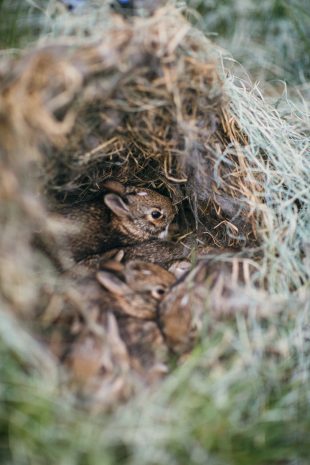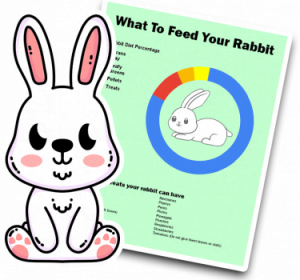
At birth, a rabbits eyes are sealed shut and will remain this way for approximately two to three weeks after birth. The reason behind this is to allow the baby rabbit to develop further outside of their mother who will be read to breed sooner. This does however make baby rabbits a prime target for predators which is why rabbits will often hide their babies inside a nest.
It’s important not to force a rabbits eyes open as this will cause damage that cannot be repaired and can lead to permanent blindness, as such you should leave any kits (Baby Rabbits) to develop in their own time after they have been birthed.
Once the baby rabbits are born, they will be blind as well as deaf. This is why during their early days the mother will leave them in their nest to look after themselves first and then produce milk for their babies. During and after a pregnancy, a doe will need to focus on creating energy and providing life support to their kits.

Your Kits (Baby Rabbits) will open their eyes from 10 – 21 days, this ranges depending on the rabbit but even with vision they won’t be able to see very far.
In most cases a baby rabbit will stick to their nest and only be able to see their mother and siblings.
Over time your rabbits vision will improve and they will become more adventurous as their eyesight sharpens.
A baby rabbit will often stay in their nest during this 3 week period as they won’t have the strength to get themselves out of the nest or see far enough, relying purely on their mother for survival.
Once a kit is ready to leave the nest they will have their eyes open, ears up and hopping around.
Unfortunately, much like most birth on this planet it can come with some complications. The problem can happen during Gestation and after birth but this shouldn’t be the worrying factor, if your baby rabbit cannot open their eyes by day 12, you should call your closest exotic veterinarian.
In some cases you may be told to wait an additional few days but will likely require a checkup. Unfortunately, there’s not a lot you can do to help the kit in this instance other than checking they are meeting a few of these specific parameters:
If your rabbit is still blind or deaf you’ll often find that certain elements of your rabbits behavior will be abnormal. For example, your rabbit may have the following symptoms:
Contrary to popular belief, no, rabbits are not born color blind. However, their understanding of color perception is limited.
Mammals retinas will contain two kinds of light-sensitive cells; these are referred to as “Cones” and “Rods”, each with their own specific jobs. Cones will detect bright light and are used to give the mammal an understanding/ability to see color, whereas Rods only work under low light conditions and do not contain any color-vision pigments.
Domestic European Rabbits have retinas which contain more rods than cones meaning that they don’t have the ability of seeing as much color as we do. This doesn’t matter too much though as rabbits typically have better low-light vision to help avoid predators.


By entering your email address you agree to receive emails from Cottontailclub. We'll respect your privacy and you can unsubscribe at any time.